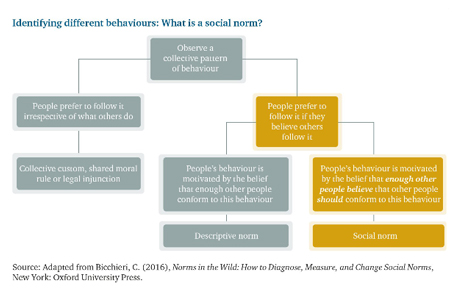A new report on corruption in Nigeria examines how anti-corruption efforts could be made significantly more effective through new ways of understanding why people engage in the practice.
That corruption is a destructive and complex practice is openly acknowledged in Nigeria, yet it remains ubiquitous in the functioning of society and economic life. Acts of diversion of federal and state revenue, business and investment capital, and foreign aid, as well as the personal incomes of Nigerian citizens, contribute to a hollowing out of the country’s public institutions and the degradation of basic services.
A new report Nigeria: A Social Norms Approach to Connecting Society and Institutions explores corruption in Nigeria as a collective practice – one that is primarily an aggregate of individual behaviours that are sustained by particular beliefs and expectations. Careful understanding of the factors that drive relevant behaviours should be a critical component of government actions to reduce corruption.
The report, authored by Leena Koni Hoffmann, an Associate Fellow of Chatham House’s Africa Programme and Raj Navanit PatelConsultant, Penn Social Norms Group (PennSONG), University of Pennsylvania, was issued by the Royal Institute of International Affairs (Chatham House). The report states that specific social drivers of specific collective practices is key to designing targeted and effective policy interventions to change those practices. This is because not all collective practices, regardless of how pernicious, are driven by a social norm and that anti-corruption efforts could be made significantly more effective through new ways of understanding why people engage in the practice.
In many of the scenarios analysed in this study, corrupt behaviour was rationalized as a response to the choices and pressures that people face.
The findings in this report present new evidence of the social beliefs and expectations that influence some day-to-day forms of corruption in Nigeria:
-
Social norms of corruption are limited to specific contexts and sectors in Nigeria. Social norms exist around specific sectors and practices, for example, law enforcement and bribery, but are not as widespread as people may assume. The findings of this research project show that social norms drive the solicitation of bribes by law enforcement officials, whereas the giving of bribes is influenced more by circumstances and by people’s beliefs about what other people are doing. There are thus opportunities for targeted interventions to address the specific beliefs and expectations that motivate corrupt behaviour in specific sectors and practices.
- If the environment or options change, behaviour will change. A clear majority of respondents in Nigeria’s rural and urban areas know when a practice is illegal, and think that others know this too. But individuals may engage in a practice that they know is wrong because they observe others doing so, or as a rational response to a situation. In many of the scenarios analysed in this study, corrupt behaviour was rationalized as a response to the choices and pressures that people face.
- Collective action is sometimes impeded because people have misconceptions about what other people really think. Survey respondents frequently underestimated the extent to which fellow citizens believe corruption to be wrong. If people were aware of how commonly held their personal beliefs are, they would be more motivated to act collectively against corruption. Anti-corruption efforts may have the greatest chance of success if they stem from a shared sense of responsibility and urgency – and thus foster collective grassroots pressure. President Buhari is certainly not alone in his high-profile stance on corruption; a significant number of Nigerians agree that it is morally unacceptable. The crucial step is translating this shared belief into an effective and sustainable coalition for collective social action.
The report proposes the following policy approaches:
- Changing incentives in contexts where corruption is a rational response or is environmentally driven.
- Targeting sectors and communities with information on the human costs of corruption.
- Reframing the approach to anti-corruption messaging and interventions.
- Highlighting and empowering trendsetters (both real and fictional) to drive behavioural change.
- Using trendsetters and social marketing strategies to overturn the false beliefs that tend to drive corrupt practices.
- Integrating behavioural insights into anti-corruption strategies.
The full report can be found at: www.chathamhouse.org
Top image: Aerial view of Lagos island and Lagos harbour, Nigeria, on 17 March 2016. Photo: Getty Images.
 ReConnect Africa is a unique website and online magazine for the African professional in the Diaspora. Packed with
essential information about careers, business and jobs, ReConnect Africa keeps you connected to the best of Africa.
ReConnect Africa is a unique website and online magazine for the African professional in the Diaspora. Packed with
essential information about careers, business and jobs, ReConnect Africa keeps you connected to the best of Africa.


